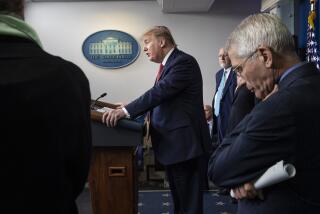Shameless Witnesses Disarm Truth : Iran-Contra Figures Threaten System of Checks and Balances
- Share via
The Iran- contra hearings are providing powerful political theater, but as an exercise of our democratic system of checks and balances they are on the brink of failure. The constitutional consequences of such a failure will be more profound than the scandal itself.
American democracy is unique in the emphasis that it places on the truth and the salutary power of revealing it. The parliaments of other nations pass laws and control purse strings, but none have Congress’ sweeping power of inquiry. Our system relies heavily on “oversight” to expose foolishness, wrongdoing and abuse and thus correct everything from crimes by a President to poorly designed IRS forms.
The Iran-contra hearings have featured a new tactic that, if allowed to work, will threaten the power of truth in our democracy. That tactic is shamelessness.
In past scandals--Watergate, CIA “dirty tricks,” the Army-McCarthy hearings--the rationalizations of those in the spotlight melted before the glare of publicity. They knew they were wrong, and the American people watching them knew they knew they were wrong. Even without impeachment or legislation, right was reaffirmed.
But it appears that there may be no such resolution to the current scandals. It is as if most of the witnesses reran videotapes of the previous hearings and realized that if they refused to act guilty they could get away with anything in the court of public opinion. If they brazened it out, there would be no villains, no wrong and, of course, no right. All that they had to do was break the unwritten law that they show some sign of conscience.
A parade of witnesses blandly admitted to treachery, deceit, duplicity and stupidities that profoundly undermined our national security as well as constitutional order. But this was accompanied by shameless lectures on democracy and patriotism. As a result, the hearings have had the moral force of the soap operas that they replaced.
This has left the system of congressional oversight in a shambles and the legislators in disarray. With malefactors treated as media heroes, what can Congress do?
It can pass new laws constraining the President, but most will be laws we would rather not have if we had confidence in the integrity of those holding high office. It is sad to think that henceforth every federal statute might have to end with the phrase, “and Mr. President, this means you!”
Alternatively, Congress can cut the budget to drive home the point that it will not be deceived. But cut what, exactly? The White House and the NSC budgets are trivial. Are major legitimate domestic and international programs to suffer?
Some believe that only elections can resolve the constitutional impasse. But is Iran-contra translating into an electoral-agenda item? No presidential timber has emerged from the hearings as it did from the Watergate and the CIA committees. Democratic Sen. Sam Nunn of Georgia, who is often mentioned as a potential presidential candidate, has occasionally been incisive. For the most part, however, he has demonstrated the validity of his own judgment that he is not ready.
On the presidential hustings, only one Democratic candidate, Michael Dukakis, is making an issue of integrity. It remains to be seen if it will resonate with the public. Among the Republicans, the most that the candidates can muster is a uniform pledge for a more “activist management style,” as if they were all bucking for CEO and not seeking the moral leadership of the nation.
A new President also cannot restore to Congress powers that it lets slip away. The buck stops on Capitol Hill. Confronted by witnesses without conscience, Congress must master the demands of conducting oversight in the age of television. TV cameramen must not be allowed to shoot witnesses from the Mount Rushmore angle; witnesses should be barred from long lectures and their counsel from interrupting when the questioning gets hot; committee counsel must have television presence, not merely courtroom skills; they must avoid asking endless minute questions--it is more important to give the viewers context than to try to ambush the witness.
These may seem like trivial points, but the power of truth is directly proportional to its ability to be communicated.
The Iran-contra committee, of course, bears the greatest responsibility for making oversight work and safeguarding our constitutional system of checks and balances. By focusing on the routine lies and deceptions of the Reagan Administration, Secretary of State George P.Shultz led the committee out of the moral desert created by Oliver North and John Poindexter. The coming appearance of Messrs. Meese, Regan and Weinberger offer the last best opportunity to crystallize these issues and dramatize what is right and wrong. If the committee fails to do so, it will not be future wrongdoers who are deterred by the prospect of congressional investigation, but Congress itself.
More to Read
Sign up for Essential California
The most important California stories and recommendations in your inbox every morning.
You may occasionally receive promotional content from the Los Angeles Times.













